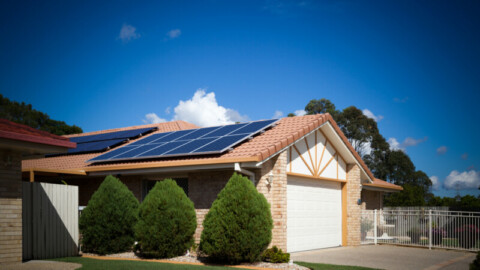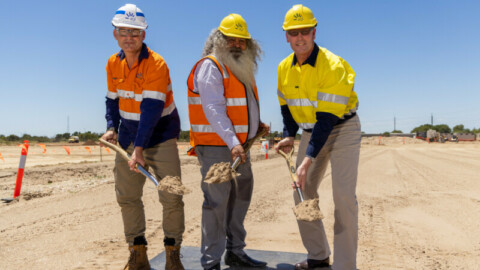The Federal Government has released Australia’s first National Electric Vehicle Strategy, a comprehensive roadmap setting out the path to a better choice of electric vehicles (EVs) for Australians and encouraging greener vehicle choices.
Following extensive public consultation, the Australian Government will introduce a Fuel Efficiency Standard, working with industry and the community to finalise details in coming months.
Federal Minister for Climate Change and Energy, Chris Bowen, said Australian governments, car makers, motoring clubs, climate groups, businesses and unions were all on board with getting cleaner and cheaper cars to Australia.
“This strategy delivers on our commitment to provide greater choice for Australians to drive cars that are cleaner and cheaper to run,” Mr Bowen said.
“This strategy provides the coordination and leadership to drive down costs and improve infrastructure so that we get more affordable and accessible electric vehicles on the market.
“The government has already cut taxes on EVs through the Electric Car Discount, saving up to $11,000 a year on a $50,000 electric vehicle. Thanks to the Albanese Government’s leadership, two and half times more EVs are being sold this year than they were at this time last year.
“Fuel-efficient and electric vehicles are cleaner and cheaper to run – this announcement is a win-win for motorists.”
Federal Minister for Infrastructure, Transport, Regional Development and Local Government, Catherine King, said the Federal Government would introduce fuel efficiency standards that work for Australia’s market.
“This strategy offers an historic opportunity to develop fuel efficiency standards that learn from international best practice, while recognising the unique needs of Australians,” Ms King said.
“It will send a strong message to the global car industry that when it comes to transport technology, Australia will no longer settle for less.
“More than 85 per cent of all cars sold in the world are subject to fuel efficiency standards. It’s time Australians were offered the same choice.”
Efficiency standards introduced
Fuel efficiency standards are standards which outline how much pollution – specifically, carbon dioxide – a car will produce when it’s running. Australia and Russia are among the only developed countries that don’t have fuel efficiency standards.
The Smart Energy Council welcomed the strategy and said each day without fuel efficiency standards costs Australians more at the bowser. The Council is calling for legislation to be introduced by September 2023, twelve months after the National Electric Vehicle Summit.
Smart Energy Council CEO, John Grimes, said, “Without robust fuel efficiency standards, Australia will become the world’s dumping ground for fossil fuel powered vehicles.
“Strong fuel efficiency standards encourage a diverse range of electric vehicles models to the market, drive efficiency improvements, lower fuel use and emissions and reduce costs for all Australians.
“Australia has had the ‘orderly and sensible’ discussion about fuel efficiency standards called for by Minister Bowen at the National EV summit in August last year. Now is the time for action – we must see legislated standards by September, a year from the Minister’s first announcement.“
Solar Citizens also welcomed the release of the National Electric Vehicle Strategy, recognising the important progress towards cleaning up Australia’s transport sector, in particular with the introduction of a Fuel Efficiency Standard by the end of the year.
Clean Transport Campaigner Ajaya Haikerwal said the Australian Government has made an important step by putting a Fuel Efficiency Standard at the centre of the Strategy, but it’s vital that the standard implemented is ambitious enough to catch Australia up with the rest of the world.
“After over 500 submissions to the consultation process, the vast majority calling for a Fuel Efficiency Standard, it’s heartening that the Government has finally got the message that it needs to put the pedal to the metal. There’s clearly the willingness from both the community and the industry to fix Fuel Efficiency Standards and get it right as soon as possible, to bring more clean car choices for all Australians,” Ms Haikerwal said.
“Australia is already at the back of the global queue when it comes to access to EVs– we’ve become a dumping ground for crappy, inefficient vehicles that aren’t accepted in other countries. We need to join the same queue as the rest of the world, but there’s no point joining at the back, or we’ll simply end up in the same predicament we’ve been in for the past decade.”
Solar Citizens analysis has shown that if the Federal Government implemented a Fuel Efficiency Standard matching the European Union, Australians could save at least $11 billion in fuel cost savings over five years, including $4 billion for regional Australia.
Environmental impact
More efficient vehicles will produce fewer emissions, meaning their environmental impact is lower and they are cheaper for motorists to run.
The absence of a standard has meant Australians households and businesses are missing out on greater choice of car models and paying more in fuel costs to run their cars because manufacturers prioritise sending more efficient vehicles to countries with standards in place.
On average, new cars in Australia use 40 per cent more fuel than the European Union, 20 per cent more than the United States and 15 per cent more than New Zealand.
Previous analysis has shown that the introduction of a fuel efficiency standard could save motorists $519 per year in fuel costs. With passenger cars making up almost ten per cent of Australia’s CO2 emissions, it is an important step to meet emissions reduction targets.
Fuel efficiency standards will only apply to new cars, and not retrospectively, so consumers will still be able to choose the vehicle they want to drive.
Australia also lags far behind other countries in EV sales, with uptake of EVs around four times lower than the global average.
The strategy also looks at reducing barriers to electric vehicle uptake, whether it be demand, supply or infrastructure, which is the critical planning that consumers have been looking for.
Transport is the third largest source of emissions in Australia. This strategy will help cut emissions by at least three million tonnes of carbon by 2030, and over ten million tonnes to 2035.
Consultation on the design of fuel efficiency standards begins today and is available through www.cleanercars.gov.au.
Following the consultation, the government will release its proposed Fuel Efficiency Standard by the end of 2023.
Industry reactions
The Australian Energy Council and the Australian Hydrogen Council have both welcomed Australia’s first National Electric Vehicle (EV) Strategy.
The national focus provided by the Federal Government’s electric vehicle strategy will be critical to stronger uptake amongst motorists, according to the peak body for energy retailers and generators, the Australian Energy Council.
The AEC’s General Manager Corporate Affairs and Retail, Ben Barnes, said, “To date we have had a fragmented approach which this national EV strategy is seeking to address.
“The centrepiece – the development of fuel efficiency standards – will be an effective way to encourage the take up of lower emissions vehicles and the strategy’s pathways for EV integration are welcomed.”
Mr Barnes said the strategy also represents a genuine opportunity for ‘low-hanging fruit’ emissions reductions with an estimated 10 per cent of Australia’s overall carbon emissions coming from passenger vehicles.
“To date the bulk of the heavy lifting on emissions reductions has been in the electricity sector and projections for emissions from the transport sector show they will increase through to 2030, so measures to address that through greater electrification will make a useful contribution to meeting Australia’s climate targets,” Mr Barnes said.
“In an EV dominated future, electricity retailers and other third parties will both install and manage EV chargers in homes. They will also use smart functionality to communicate with and manage devices such as electric vehicle supply equipment (EVSE) on the customer’s behalf.
“The current national mix of inconsistent service and installation rules that apply to anyone wanting to connect EVSE to a network represents a significant barrier, along with multiple unique network connection processes.”
Mr Barnes said clunky network connection processes are not a new issue but will certainly be exaggerated by the increased uptake of EVs, he welcomes the Federal Government’s attention to these issues.
CEO of the Australian Hydrogen Council, Dr Fiona Simon, said the Australian Hydrogen Council (AHC) welcomes the Federal Government’s National Electric Vehicle Strategy, in particular the commitment to introduce a Fuel Efficiency Standard by the end of 2023.
“Fuel cell electric vehicles (FCEVs) will work alongside battery electric vehicles (BEVs) to provide the Australian market with decarbonised mobility options to suit their individual cases – including vehicle size, distance travelled, time of day use, payload and location,” Dr Simon said.
“One of the key barriers to hydrogen use in transport has been insufficient market demand to draw through supply and we have previously recommended the government develop fuel efficiency standards for all vehicle types to remedy this.
“Policy settings that will create demand for zero emissions vehicles will need to value the public benefit of clean hydrogen and electric vehicles relative to incumbent fuels. This will give certainty to global vehicle manufacturers and investors to improve their business cases for sending vehicles to Australia.”
Dr Simon said the National Electric Vehicle Strategy is a move in the right direction and the AHC will be working closely with the government as it designs a fuel efficiency standards to ensure the benefits of hydrogen FCEVs are realised.
The National Electric Vehicle Strategy is available at https://www.dcceew.gov.au/energy/transport.
















